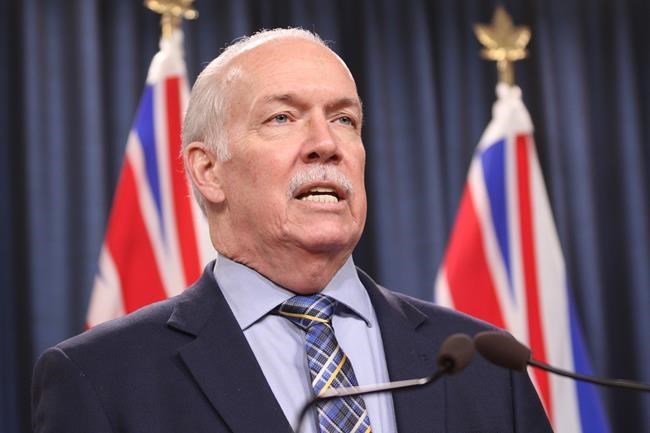VICTORIA — British Columbia's public auto insurer is giving a one-time rebate to help drivers cope with the cost of rising fuel prices caused by Russia's invasion of Ukraine, Premier John Horgan announced Friday.
Horgan said the provincial government approached the Insurance Corporation of B.C. to provide drivers who have a basic auto insurance policy with a $110 rebate and commercial drivers with $165.
“Today, if we go to fill up at the pumps, sometimes it feels like it’s a bit of a holdup," he told a news conference. "Prices are at unprecedented levels and those prices at the pump are a direct result of (Russian President) Vladimir Putin’s invasion of Ukraine.”
Gas prices in B.C.'s Lower Mainland hovered around $1.95 per litre on Friday. Outside Metro Vancouver, where taxes are lower, drivers were paying about 10 cents less per litre.
Horgan said the one-time payment is a better approach than cutting fuel taxes because the price will only increase again at the pumps.
He said the corporation is in a financial position to cover the cost of $395-million rebate. It is forecasting an annual net income of $1.9 billion for the 2021-22 fiscal year ending March 31.
In 2018, David Eby, who was then the minister in charge of the insurance corporation, compared the finances of the public auto insurer to a dumpster fire.
The NDP brought in legislation to prevent governments from dipping into reserves at the corporation "to pad their budgets," Horgan said Friday.
But the difference with the rebate, he said, is that the money is going back to policy holders, who finance the corporation.
"This is a rebate based on the robust position the corporation is in," Horgan said.
Public Safety Minister Mike Farnworth said drivers can expect the rebate to start rolling out in May.
Prof. Werner Antweiler, an economist at the University of British Columbia, said the relief payment will help as the market deals with a shortage of gasoline.
"The idea is we're not interfering in the market. The market needs to do its magic of closing the gap between supply and demand through higher (gas) prices," he said in an interview. "The higher prices are necessary."
Antweiler said the focus needs to be on giving financial relief to commercial drivers because, in theory, if they get help, they won't pass added costs on to consumers.
Peter Milobar, the B.C. Liberal party's finance critic, said the government's approach doesn't target help at those who need it most as everyone gets the same rebate, including owners of electric vehicles.
"The fact that a single parent working two jobs and driving a Honda Civic is getting the same one-time rebate as a Tesla owner is ridiculous," he said in a news release.
"Not everyone feels the impacts of these sky-high prices the same."
— By Nick Wells in Vancouver.
This report by The Canadian Press was first published March 25, 2022.
The Canadian Press




